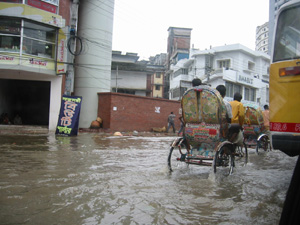Pittsburgh Sweatshop Audit Strengthens Sweatshop Alliance's Demands on Pirates Baseball Club
Submitted on Sat, 07/14/2007 - 8:15pm

Jason Fults represented the IWW's International Solidarity Commission and the Pittsburgh Anti Sweatshop Community Alliance in June of 2007. This year's monsoon (pictured, right and below) was particularly devastating. Workers were forced from their homes near the Export Zones and also unable to travel home to their villages. Workers were victimized by both employers and some "aid" agencies. The Pittsburgh Anti Sweatshop Community Alliance has made a request for information from US AID and hopes to find specific ways to support Garment Workers in Bangladesh in the future.
Read the complete Pittsburgh Sweatshop Audit HERE including the response from the city law department.
The complete press packet prepared by the Controller is HERE. Includes the Pittsburgh Sweatshop Audit Executive Summary, the Pittsburgh and Allegheny County Ordinances, the International Solidarity Commission’s 2007 All Star Game Community Collective Bargaining Statement, July 3 PASCA letter to the Controller requesting a “Report Card” on PNC Park.
City's policy on sweatshops called failure by controller
Saturday, July 14, 2007 - By Rich Lord, Pittsburgh Post-Gazette
City of Pittsburgh rules designed to prevent the purchase of goods made in sweatshops aren't effective, acting Controller Tony Pokora said yesterday.
He released a report urging the city to follow the lead of other governments that demand to know where goods they buy are made and what the workers are paid.
"It has no teeth to it whatsoever," he said of the city's ordinance, passed in 1997 and often criticized by anti-sweatshop crusaders as inadequate.
"People worldwide should be receiving a decent wage for a decent day's work," he added, and the city should do more to ensure that happens. "We've always been a leader in equal rights, equal wages."
Vendors who sell products to the city must sign a form saying that, as far as they know, the goods aren't made under sweatshop conditions.
San Francisco, among others, requires that its vendors disclose the location of the factory in which the goods are made. It employs an enforcement officer who makes sure working conditions meet certain standards.
 Mr. Pokora said the city and Allegheny County, who often buy goods together, should change their codes to require the disclosure of the factory from which the goods came and the wages paid. That would allow an unspecified "monitoring organization" to check into wages, hours worked, and health and safety conditions.
Mr. Pokora said the city and Allegheny County, who often buy goods together, should change their codes to require the disclosure of the factory from which the goods came and the wages paid. That would allow an unspecified "monitoring organization" to check into wages, hours worked, and health and safety conditions."It's just something that we have been saying for years and years," said Celeste Taylor, a board member of Sweat Free Communities and a member of the Pittsburgh Anti-Sweatshop Community Alliance. Along with anti-sweatshop activist Kenneth Miller, she has been urging City Council to address the ordinance's shortcomings.
The controller's report "really provides us with a lot of credibility and direction, and just very specific recommendations," she said, which will be used to push the city, county, state and Pirates baseball club to ensure they're not buying from sweatshops.
City Finance Director Scott Kunka wrote that the city is enforcing the current ordinance. He said he would ask the Law Department to study the proposed changes.
(Rich Lord can be reached at [email protected] or 412-263-1542. )